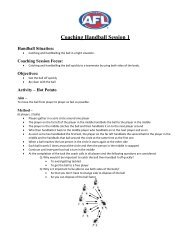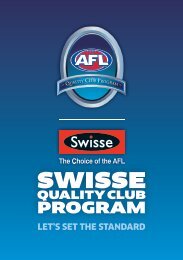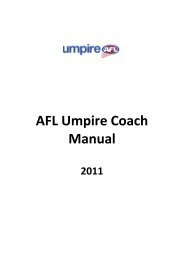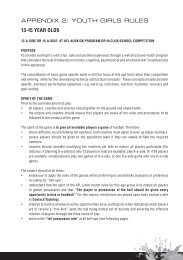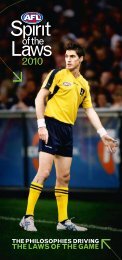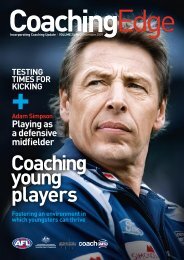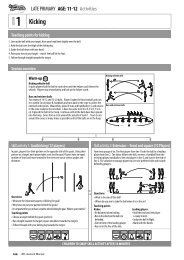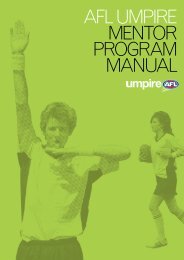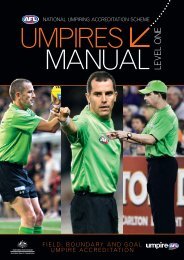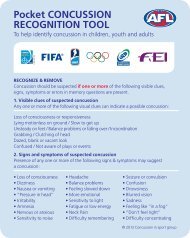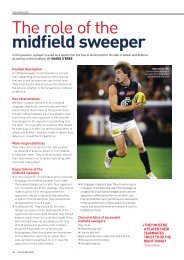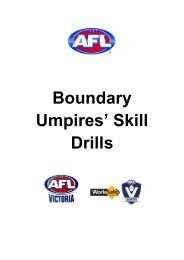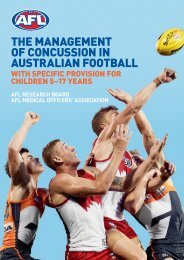2012 Youth Coaching Manual - AFL Community
2012 Youth Coaching Manual - AFL Community
2012 Youth Coaching Manual - AFL Community
Create successful ePaper yourself
Turn your PDF publications into a flip-book with our unique Google optimized e-Paper software.
PREPARATION<br />
Elite footballers often have a particular food or meal that they prefer before a game, and it is important for individuals to<br />
determine what works best for them. There are a number of general guidelines to consider:<br />
• The pre-game meal should include carbohydrates as the preferred energy source.<br />
• It should usually be eaten at least two hours before the game, depending on individual tolerance and preference.<br />
• The meal should include a large drink – aim for 500ml.<br />
• Foods that are not too high in fat or fibre are often better tolerated.<br />
Suggested pre-game foods include:<br />
• Breakfast cereal with low-fat milk and fruit.<br />
• Low-fat fruit smoothie.<br />
• Bread, toast or crumpets with suitable toppings – jam, honey, baked beans, spaghetti.<br />
• Pasta with tomato-based, low-fat sauce.<br />
• Liquid nutrition supplements (useful if appetite is low or feeling nervous).<br />
During the game<br />
It is essential to maintain regular fluid intake throughout training sessions and games. A general recommendation is 150-<br />
250ml every 15 minutes (up to 600-1000ml per hour), but this will depend on a range of factors including individual<br />
sweat rates, intensity of exercise and climate (temperature and humidity). Some ‘running’ players may also need to top up<br />
carbohydrates at half-time, with a small snack such as fruit or a sports drink.<br />
Recovery<br />
Foods and fluids consumed after the game have an important effect on the rate of recovery. Fluid and carbohydrates are the priority<br />
for immediate recovery. Studies show that in the 15 minutes after the game a player has the opportunity to restore muscle glycogen<br />
at a much faster rate than normal. Foods to be consumed by players can include fruits such as bananas, pineapple and melon fruits,<br />
sandwiches, rolls and low-fat dairy foods. Including protein in the post-game snack or meal also provides benefits for muscle recovery.<br />
Hydration and fluid replacement<br />
Water makes up about 60 per cent of the total body weight, and major reductions in this volume can seriously interrupt<br />
normal bodily functions and, therefore, impair performance. Players should maintain an adequate fluid intake before,<br />
during and after games and training sessions to help prevent dehydration. Players should be encouraged to replace fluids<br />
over a period of time and not in one ‘drinking bout’. Some individuals can lose as much as four to five litres of water over<br />
a two-hour training session or game.<br />
Dehydration can lead to serious problems and parents, coaches and players should be aware of the following:<br />
• Thirst is a poor indicator of fluid loss – players should not wait until they are thirsty!<br />
• Players should drink about 500ml during the 30-60 minutes prior to activity.<br />
• During activity, players should consume at least 200ml every 10-15 minutes, according to individual needs.<br />
• During the hours following activity, players should aim to drink 1.5 times the amount of fluid lost during exercise.<br />
Monitoring body weight pre- and post-exercise can provide an indication of individual losses (1 kilogram = 1 litre).<br />
• Take care also not to over-drink – consuming too much water can lead to a condition called hyponatremia, which can cause<br />
a range of symptoms and potential health problems.<br />
Water is the best fluid, although some players may benefit from commercial sports drinks which contain carbohydrates and<br />
electrolytes to promote optimal hydration.<br />
Exercise in the heat<br />
In warmer weather, the risk of dehydration increases, and extra precautions should be taken to reduce the risk of heat injury.<br />
• Arrange training sessions in the cooler parts of the day.<br />
• Suitable clothing should be worn.<br />
• If the temperature or humidity is too high, cancel training.<br />
• Keep a close watch on the heavier and less-fit players.<br />
• During training and games, fluids should be readily available and players encouraged to consume regularly.<br />
Further information and resources:<br />
Sports Dietitians Australia www.sportsdietitians.com<br />
Sports Medicine Australia www.sma.org.au<br />
122 <strong>AFL</strong> <strong>Youth</strong> <strong>Coaching</strong> <strong>Manual</strong>



